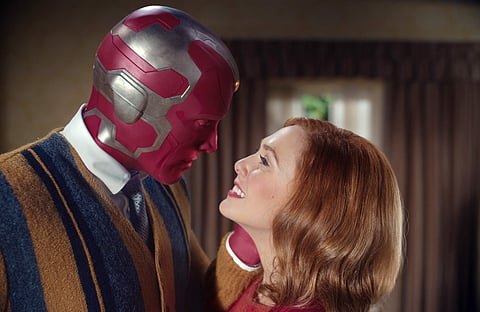Wandavision Series Review: Bridging the past and the future of the MCU
Rating:(3.5 / 5)
Denial.
In a post-truth world, what are facts? President Trump refused to accept his loss for over two months. His actions enabled a section of people to violently pursue an insurrection against the elected government. In such a scenario, the affected human seeks comfort against this reality. What if one such human, in denial, chooses an echo chamber that validates their existence? Would you call that fantasy? Or would you call that, to paraphrase the iconic Bill Waterson, being selective about the reality you accept? This forms the core of Marvel's first post-Avengers Endgame offering - Wandavision; a series that continuously questions what is crueler - a reality you chose to deny or a fantasy that you chose to adopt?
Cast: Elizabeth Olsen, Paul Bettany, Kathryn Hahn
Created by: Jac Schaeffer
Directed by: Matt Shakman
Anger.
In Wandavision, the two titular characters provide a study in contrast in terms of anger. Wanda Maximoff (Elizabeth Olsen) has a shock of red hair, wears red clothes, her eyes turn red every time she gets angry. She lives in a red hex. You get the drift. Red has long been associated with anger in pop culture and Wanda lives and breathes the emotion. Contrast that to Vision (Paul Bettany), whose face is a streak of red but who is largely devoid of anger. He is the Aristotlean stoic who gets "angry at the right person to the right degree, for the right amount of time and for the right purpose." The show, through its nine episodes, traverses multiple decades from the 1960s to 2010s with the popular sitcoms of those decades forming the core. As it moves from the black-and-white era to colour era, the show also becomes more angry — subtlety slowly giving space for showmanship.
Bargaining.
With each passing episode, I was wondering if I was getting more than I bargained for from this show. The inhabitants of the fictional town of Westview probably wondered the same. The cries of help to higher powers are at once comical and deeply disturbing. The writing consistently uses the dark humour motif to underpin the absence of choice in everyday human life. It also bridges the past and present of the Marvel Cinematic Universe adroitly and at the same time deepens the lore by introducing iconic characters from the comic verse. The seventh episode (Breaking the Fourth Wall), in particular, has some flourishes that are quite spectacular. In the finale, with the typical mid-credits and end-credits scenes, Marvel's deft writing makes us wonder about a few specific events in the last three phases of the MCU and sets it all up for next year's Doctor Strange 2.
Depression.
The sound design of the show is largely unobtrusive. At certain poignant moments, the show uses the most powerful sound of all: silence. The fifth episode (On a Very Special Episode...), the sixth one (All-New Halloween Spooktacular!), and last two episodes (Previously On and The Series Finale) have their inflection points that showcase the vagaries of human existence. Do humans really have a choice in their actions? Or is everything predecided for them? Do we have an all-mighty being controlling every single whim? Are these words that you are reading predestined? The show gives an insight into the themes MCU is likely to explore in the next phase or two — deterministic vs indeterministic philosophy. While one might argue this forms the core of Campbell's hero's journey, it would be interesting to see this from the eyes of Marvel, which has chosen melancholy as the flavour to start off with.
Acceptance.
Death is never easy to come to terms with. There is always an Agnes (Kathryn Hahn) who offers a distraction from reality. She is the smile you long forgot to wear. She is the comfort you long forgot to experience. But when you look past what the world offers, beyond the facades, you realise that truth will always come calling. This is not just an acceptance for Wanda and Vision, but also for the multitudes of MCU fans after the events of Avengers: Endgame. Wandavision is Marvel personifying the Albus Dumbledore quote: "To the well organised mind, death is but the next great adventure." Through this show, Marvel offers us the Ship of Theseus parable as a sneak peek into how it will forge its own identity for the next phase.
As you move past your five stages of grief vis-a-vis the events of the Infinity Era, just like Wanda Maximoff does in this show, you will realise what Vision really meant when he said, "What is grief, if not love persevering?"


